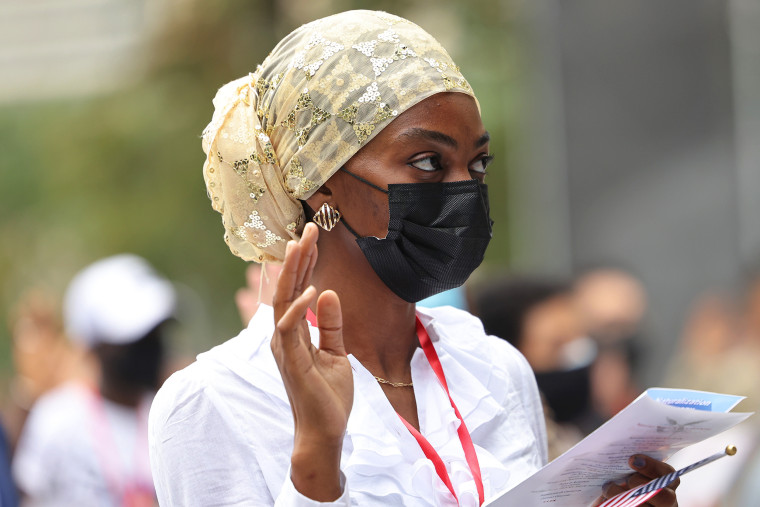One in 10 Black people living in the U.S. are immigrants, and the number is only expected to rise, according to new data.
A Pew Research Center analysis of data from the U.S. Census Bureau and the University of Minnesota found that 4.6 million Black immigrants were living in the U.S. in 2019. That figure grew from about 800,000 in 1980. According to the report, 9.5 million Black immigrants are expected to live in the U.S. by 2060. The Black population represents all those who self-identify as Black.
The analysis also found that the Black immigrant population is projected to outpace the growth of the U.S.-born Black population. This growth is fueled by the influx of individuals migrating from Africa.
In 2000, approximately 560,000 African immigrants resided in the U.S., the report found. By 2019, that number had nearly tripled, to 1.9 million. Between 2010 and 2019, 43 percent of African-born Black immigrants settled in the U.S., which was the highest share compared to other U.S. immigrant groups.
Although the Black immigration population is growing, many still face challenges related to racism, criminalization and deportation. Abraham Paulos, deputy director of policy and communications for the Black Alliance for Just Immigration, said his organization focuses on these three challenges while making sure immigrant communities have financial resources, food and clothing.
These resources were greatly needed during the pandemic, as many Black immigrants worked as essential workers in health care. The organization’s efforts also focus on politically educating the Black immigrant community on the struggles related to being a Black person living in the U.S.
“We fight for two things: racial justice and migrant rights,” Paulos said. “We fight for Black people.”
Born in Sudan, Paulos migrated to the U.S. with his family as a youth in the 1980s. He said the challenges Black immigrants face tend to stem from the criminal justice system.
“I’ve had cousins that have gotten deported,” he said. “One cousin just got out of a detention center.”
Based in Brooklyn, New York, Black Alliance for Just Immigration advocates for temporary protected status, which is granted to foreign-born individuals unable to return to their country of origin because of circumstances such as civil war or environmental disasters. According to the National Immigration Forum, the U.S. provides temporary protected status to more than 400,000 foreign nationals from countries including Venezuela, Sudan and Haiti.
Challenges faced by U.S.-born Black Americans are also shared by Black immigrants. According to the Pew Research Center, Black immigrants were less likely than overall immigrants to own their own home, and 14 percent of Black immigrants lived below the poverty line in 2019, which is higher than the poverty rate among the greater U.S. population.
While African immigrants contribute to the growth of the Black immigrant population, the Pew Research Center’s report found that the Caribbean remains the most common region of birth for Black immigrants, with Jamaica and Haiti being the two largest origin countries.
Last year, thousands of Haitian immigrants fled to the U.S from Central and South America to seek asylum. Viral images taken of Haitians revealed harsh treatment by Border Patrol agents, including agents apparently carrying whips. According to The Refugee and Immigrant Center for Education and Legal Services, the U.S. consistently detained Haitians more than any other nationality in 2020.
Paulos said the situation in Del Rio, Texas, is emblematic of what Black immigrants face.
“By and large, the biggest difference between, sort of, us and other immigrants is, you know, one, we deal with Black America,” Paulos said. “Two is that we feel the full brunt of the force of Department of Homeland Security, the enforcement apparatus.”
While many Black immigrants face these challenges, living in the U.S. also provides opportunities for advancement. The Pew Research Center analysis found that 31 percent of Black immigrants ages 25 and over have a bachelor’s degree or higher.
Atonya McClain, an immigration attorney based in Houston, said her clients, who mostly come from Nigeria and the Dominican Republic, journey to the U.S. for reasons relating to safety and greater access to better resources. She said one of her previous clients informed her that during the pandemic, his village in Nigeria only had electricity for one hour each day.
“If you’re here in the United States and you know how well you’re doing,” McClain said, “and you’re talking to your loved ones, you want them to have the same options that you have.”
In addition to advocating for temporary status, Black Alliance for Just Immigration monitors situations of Black immigrants in prison. Paulos said the organization has approximately eight Freedom of Information Act requests filed in multiple detention centers throughout the South. The organization would use that information to help fight for the immigrants’ release.
Paulos also said it’s difficult for Black immigrants to assimilate into the U.S. compared to other groups because of challenges related to having a Black identity. Misconceptions of being invisible and a false narrative of Black immigrants being divided with Black Americans are also misleading, he said.
“I just think that racism is so embedded in this society that if you’re Black, it’s like, you know, all people see is Black,” he said.

